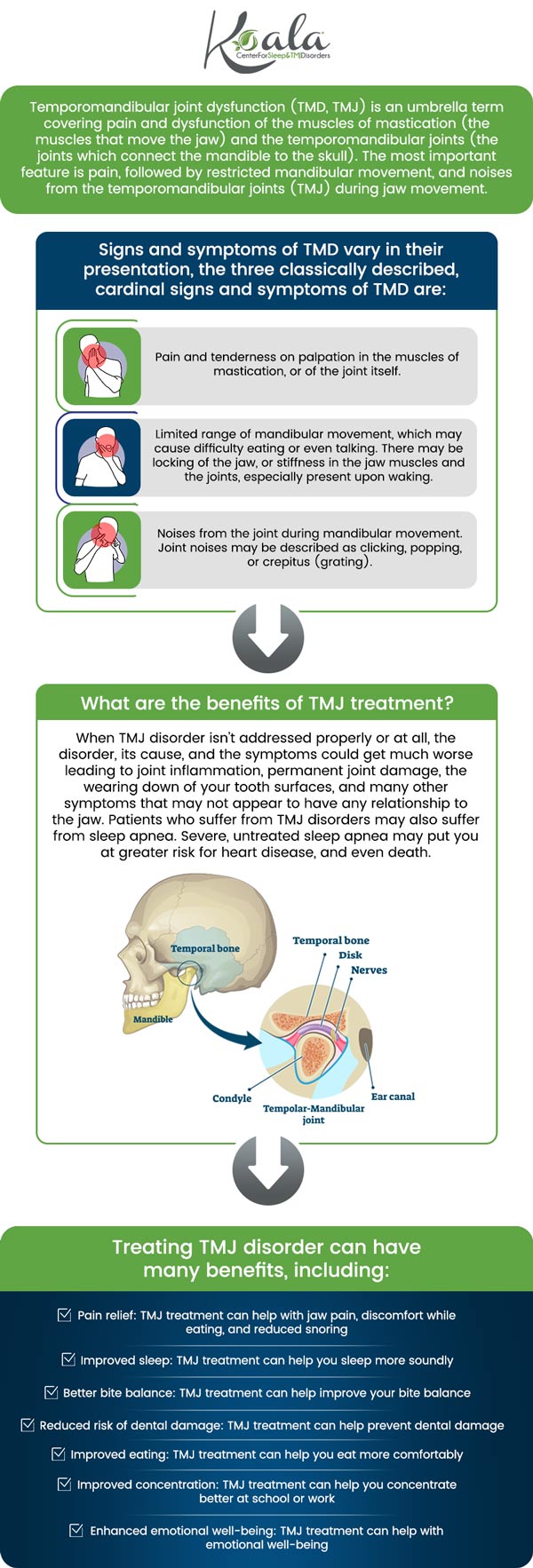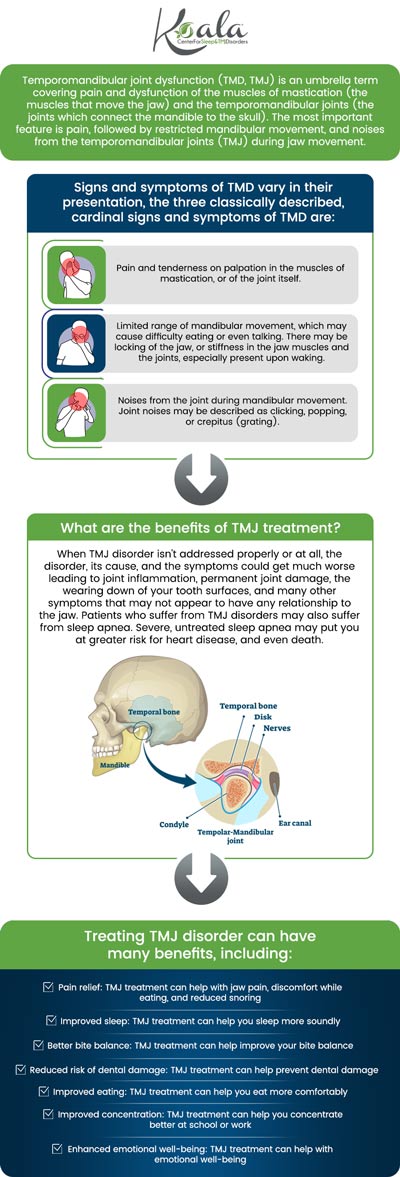Where Can I Find a TMJ Specialist in Bloomington, IL?
At Koala Centers For Sleep & TMJ Disorders, Our professionals understand that certain foods and habits can strain the TMJ. We can provide you with guidance on dietary choices and lifestyle modifications to help manage your TMJ disorder. For more information, contact us or book an appointment online. We are conveniently located at 2309 E. Empire St. Ste 500 Bloomington, IL 61704.




Table of Contents:
How to relax TMJ jaw?
Why does my jaw hurt so bad I can’t chew?
How is TMD diagnosed?
What treatments are available for TMD?
At Koala Center For Sleep & TMJ Disorders, we specialize in treating sleep-related disorders, including temporomandibular joint (TMJ) disorders which can cause discomfort, jaw pain, and headaches, interfering with your daily life and sleep pattern. While there is no complete cure, we can provide you with various strategies and exercises to manage symptoms, alleviate pain, and improve your overall well-being.
● Relaxation Techniques: Engaging in stress-reducing activities like yoga, meditation, or deep breathing exercises to reduce tension in your jaw. Doing these regularly can calm your nervous system, relax the muscles and thus help alleviate symptoms of TMJ disorder.
● Jaw Exercises: Our specialists can guide you through jaw-strengthening exercises designed to reduce the likelihood of TMJ pain. We can also teach you how to do gentle jaw massages to stimulate blood flow, relieve tension, and reduce pain.
● Other Tips: We often recommend applying a warm compress or ice pack to the jaw area to help relax the muscles, increase blood flow, and ease discomfort. Maintaining good posture, especially when using electronic devices or sitting at a desk is also helpful.
If your TMJ disorder is severe or persistent, our healthcare professionals can provide further evaluation and treatment options. This could include physical therapy, medications, or in some cases, surgery.
Severe jaw pain can profoundly impact daily activities such as chewing, talking, and sleeping. Multiple causes can contribute to this discomfort, so identifying the underlying issue is important for necessary treatment.
Temporomandibular joint disorder (TMD) is a common cause of severe jaw pain. It can result from an injury, overuse, or arthritis in the joint, leading to pain while chewing or even opening your mouth. Dental issues, such as tooth decay, gum disease, impacted teeth, or malocclusion (incorrect alignment of teeth), can also cause severe jaw pain.
Similarly, severe sinus infections can cause swelling and inflammation extending to the jaw, triggering pain. In some cases, osteoarthritis, a degenerative joint disease, or rheumatoid arthritis, an autoimmune disease, can affect the jaw, causing pain, stiffness, and reduced range of motion.
Remember, persistent or worsening jaw pain should always warrant a healthcare consultation. At Koala Center For Sleep & TMJ Disorders we believe that early diagnosis and appropriate treatment can prevent further damage, alleviate the pain, and address its root cause.
Diagnosing TMD is a precise and comprehensive process, typically conducted by specialized dentists or oral surgeons. We offer a detailed and thorough diagnosis process involving several steps:
Medical History and Physical Examination: The first step in the diagnosis process at our center involves taking an exhaustive medical history to understand any symptoms, injuries, or underlying conditions that may be causing the issue. This includes asking about jaw movement difficulties, the severity and duration of any pain, and any noticeable noises when the jaw is in motion.
The physical examination is a crucial part of the diagnosis. Our healthcare providers will touch and move the patient’s jaw to assess its range of motion, identify areas of discomfort or pain, and listen for sounds such as clicking or popping when the jaw moves. This also includes a detailed examination of the patient’s face, jaw, neck, and head to check for tenderness, flexibility, and overall function.
Imaging Studies and Other Tests: Imaging tests can provide a detailed view of the temporomandibular joint. It can include X-rays, which provide images of the bones and can show any abnormalities in the jaw’s structure, and CT scans, which give more detailed images of the bones.
MRI scans can show issues with the soft tissues, such as the disc in the TMJ. Nerve tests can determine if there is any nerve damage associated with TMD.
In some cases, our doctors may use a diagnostic arthroscopy. This involves inserting a small thin tube (cannula) into the joint space, and then a small camera (arthroscope) is placed to view the area and look for any problems. However, this method is typically used more for treatment than for diagnosis.
Finally, our healthcare provider may also use dental models (impressions of the teeth) or a bite analysis to study the patient’s bite. Misalignment or dental problems can often contribute to TMD.
Differential Diagnosis: It is important to differentiate TMD from other conditions that can mimic its symptoms. These may include sinus infections, dental problems, myofascial pain syndrome, arthritis, and trigeminal neuralgia.
Diagnostic Criteria: To establish a diagnosis of TMD, several criteria must be met, including persistent pain or discomfort in the jaw joint or surrounding areas, limited jaw mobility or locking of the joint, clicking or popping sounds during jaw movement, and tenderness or swelling in the jaw muscles or joint.
Based on these findings, we can determine whether a patient has TMD and what treatment options may be most effective.
The team at Koala® Center For Sleep & TMJ Disorders specializes in treating a range of sleep-related disorders, one of which is temporomandibular joint disorder (TMD). This condition affects the jaw joint and surrounding muscles, leading to symptoms like pain, difficulty chewing, and limitations in jaw movement. We believe in offering a comprehensive array of treatments to address TMJ disorders.
Non-Invasive Treatment Options:
● Medications: We can prescribe suitable pain relievers, anti-inflammatories, or muscle relaxants to manage your pain and reduce inflammation or muscle spasms.
● Oral Appliance Therapy: Our team can create custom-made mouthguards or oral splints that can help reposition your jaw, reduce muscle tension, improve joint function, and prevent clenching and grinding.
● Physical Therapy: Physical therapy can help you strengthen your jaw muscles, improving flexibility and reducing pain.
● Heat and Cold Therapy: We can guide you on how to apply heat or cold packs to reduce inflammation and discomfort.
Minimally Invasive Procedures:
● Botox Injections: Our qualified professionals can administer Botulinum toxin injections to relax the muscles around your jaw, reducing muscle spasms and pain.
In addition to these treatments, we provide guidance on lifestyle modifications that can help manage TMJ disorders. This might involve stress management techniques, dietary advice, or recommendations on limiting activities that might strain the jaw.
At Koala® Center For Sleep & TMJ Disorders, we’re dedicated to providing personalized care. We’ll provide a thorough evaluation of your condition and develop a treatment plan tailored to your specific needs. Call us today to book an appointment. We serve patients from Bloomington IL, Normal IL, Gillum IL, Barnes IL, and Towanda IL.

Additional Services You May Need
▸ KoalaKIDZzz®
▸ Sleep Apnea
▸ Snoring
▸ TMJ Disorder
▸ Fatigue
▸ Sleep Disorders
▸ Weight Loss
▸ CPAP Alternative
▸ Oral Appliances




